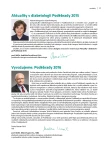Pharmacogenetics of oral antidiabetic treatment
Authors:
Ivan Tkáč
Authors‘ workplace:
IV. interná klinika LF UPJŠ LF a UN L. Pasteura, Košice, Slovenská republika
Published in:
Vnitř Lék 2016; 62(3): 186-188
Category:
Reviews
Overview
Pharmacogenetics is the study of how genes (individual genotypes) affect a person‘s response to drugs. At present, recommendations made about the treatment of some monogenic forms of diabetes are based on genetic diagnostics. The first studies in the field of pharmacogenetics of oral antidiabetics have now been published which have identified associations of individual genetic variants with response to treatment. The response to sulfonylurea derivatives was significantly associated with the variants KCNJ11/ABCC8, TCF7L2 and CYP2C9. The response to metformin treatment was associated with the genetic variants ATM and SLC47A1. The response to treatment with glitazones was associated with the genetic variant PPARG. The therapeutic response to the treatment with gliptins was associated with the genetic variants TCF7L2 and CTRB1/2. It may be expected that in the near future pharmacogenetic knowledge will also be used within personalized treatment of type 2 diabetes.
Key words:
type 2 diabetes mellitus – pharmacogenetics – monogenic diabetes – oral antidiabetics – personalized treatment
Sources
1. Pearson ER, Starkey BJ, Powell RJ et al. Genetic cause of hyperglycaemia and response to treatment in diabetes. Lancet 2003; 362(9392): 1275–1281.
2. Pearson ER, Flechtner I, Njolstad PR et al. Switching from insulin to oral sulfonylureas in patients with diabetes due to Kir6.2 mutations. N Engl J Med 2006; 355(5): 467–477.
3. Feng Y, Mao G, Ren X et al. Ser1369Ala variant in sulfonylurea receptor gene ABCC8 is associated with antidiabetic efficacy of gliclazide in Chinese type 2 diabetic patients. Diabetes Care 2008; 31(10): 1939–1944.
4. Javorsky M, Klimcakova L, Schroner Z et al. KCNJ11 gene E23K variant and therapeutic response to sulfonylureas. Eur J Intern Med 2012; 23(3): 245–249.
5. Pearson ER, Donelly LA, Kimber C et al. Variation in TCF7L2 influences therapeutic response to sulfonylureas. A GoDARTs Study. Diabetes 2007; 56(8): 2178–2182.
6. Javorský M, Babjaková E, Klimčáková L et al. Association between TCF7L2 genotype and glycemic control in diabetic patients treated with gliclazide. Int J Endocrinol 2013; 2013 : 374858. Dostupné z DOI: http://dx.doi.org/10.1155/2013/374858.
7. Holstein A, Hahnl M, Körner A et al. TCF7L2 and therapeutic response to sulfonylureas in patients with type 2 diabetes. BMC Med Genet 2011; 24 : 12–30.
8. Zhou K, Donnelly LA, Burch L et al. Loss-of-function CYP2C9 variants improve therapeutic response to sulfonylureas in type 2 diabetes: a Go-DARTS study. Clin Pharmacol Therap 2010; 87(1): 52–56.
9. Becker ML, Visser LE, van Schaik RH et al. Genetic variation in the multidrug and toxin extrusion 1 transporter protein influences the glucose-lowering effect of metformin in patients with diabetes: a preliminary study. Diabetes 2009; 58(3): 745–749.
10. Tkáč I, Klimčáková L, Javorský M et al. Pharmacogenomic association between a variant in SLC47A1 gene and therapeutic response to metformin in type 2 diabetes. Diabetes Obes Metab 2013; 15(2): 189–191.
11. Zhou K, Bellenguez C, Spencer CCA et al. Common variants near ATM are associated with glycemic response to metformin in type 2 diabetes. Nat Genet 2011; 43(2): 117–120.
12. Hsieh MC, Lin KD, Tien KJ et al. Common polymorphisms of the peroxisome proliferator-activated receptor-γ (Pro12Ala) and peroxisome proliferator-activated receptor-γ coactivator-1 (Gly482Ser) and the response to pioglitazone in Chinese patients with type 2 diabetes mellitus. Metabolism 2010; 59(8): 1139–1144.
13. Kang ES, Park SY, Kim HJ et al. Effects of Pro12Ala polymorphism of peroxisome proliferator-activated receptor γ2 gene on rosiglitazone response in type 2 diabetes. Clin Pharmacol Therap 2005; 78(2): 202–208.
14. Zimdahl H, Ittrich K, Graefe-Mody U et al. Influence of TCF7L2 gene variants on the therapeutic response to the dipeptidylpetidase-4 inhibitor linagliptin. Diabetologia 2014; 57(9): 1869–1875.
15. ´t Hart LM, Fritsche A, Nijpels G et al. The CTRB1/2 locus affects diabetes susceptibility and treatment via the incretin pathway. Diabetes 2013; 62(9): 3275–3281.
Labels
Diabetology Endocrinology Internal medicineArticle was published in
Internal Medicine

2016 Issue 3
-
All articles in this issue
- Obesity paradoxes
- Clinical aspects of pharmacological treatment of diabetic neuropathy – cooperation with neurologists and diabetologists
- Pharmacogenetics of oral antidiabetic treatment
- Cholesterol metabolism in patients with type 2 diabetes
- Victoza changes diabetes and lives of patients 5 years already
- XIGDUO – fixed combination of the active ingredients dapagliflozin and metformin
- Diabetes mellitus and pancreas cancer
- Early detection of ISHD in diabetic patients and determining the type of treatment
- What is the significance of the phenomenon of hypertension in disguise in patients with type 2 diabetes mellitus treated for long-lasting hypertension?
- Management of type 2 diabetes mellitus therapy in a mature age
- Motor vehicle driving and diabetes mellitus – medical aspects
- Motor vehicle driving and not only diabetes mellitus – certain aspects of the legislations in the Czech Republic
- “Healthy behaviour” and mental resilience in youth within the Diateens project
- Internal Medicine
- Journal archive
- Current issue
- Online only
- About the journal
Most read in this issue
- Victoza changes diabetes and lives of patients 5 years already
- Motor vehicle driving and diabetes mellitus – medical aspects
- Diabetes mellitus and pancreas cancer
- Obesity paradoxes
